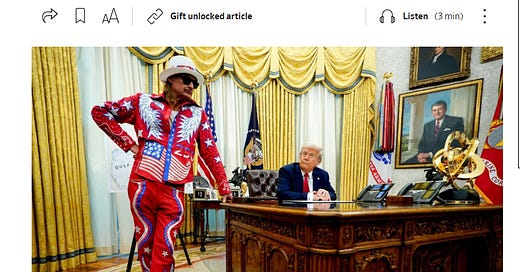My father always asks me, “What have you learned recently?” For once, I have an answer. I learned some economics by listening to a discussion between Kid Rock and President Trump.
While I own at least one Kid Rock album, I don’t own this outfit, and Dora doesn’t think that I would look good in it.
Dora also didn’t want to hear the press conference where the President and The Kid discussed scalper economics in depth. Kid Rock is an intelligent guy.
The Traditional Case for Scalpers
Scalpers are middlemen. They pay the costs of acquiring tickets for an event (such as sports or music) and then hold onto them, selling them for a price that a buyer is willing to pay. They bear the risk (that ex-post demand will be low, perhaps due to bad weather) and, in the past, they bore the costs of standing in line to buy the tickets. Read this nice piece for more details.
The Rise of the Bots
On Wall Street, we often hear reports of the importance of being the first traders through speed trading. Kid Rock was disgusted by the rise of Ticket Bots that sweep in and buy 1000s of tickets before his true fans can log in and buy them. This represents a private property race. The first to buy the tickets now controls the inventory and charges a markup.
Remedies
While Kid Rock proclaimed himself a capitalist who believes in small government, in this case, he wants regulation, and President Trump signed a new executive order.
A direct quote from the WSJ
“The order directs the Federal Trade Commission to more rigorously enforce existing law governing the use of bots that help scalpers scoop up hot tickets, including by issuing fines. Trump said the FTC, along with the Treasury and Justice departments, will deliver a report within 180 days summarizing what they have done to address unfair practices in the live-events business and recommend more regulation or legislation to protect consumers.”
Artists who are frustrated by the Bots privatizing the scarce asset (seats at their shows) could credibly commit to using a randomization device to select which lucky fans would receive tickets at the stated ticket price. Amazon could be paid a fee to be the platform for clearing this transaction. So, Matt and Dora have an Amazon account. We would click that we want to be in the Kid Rock lottery. Amazon would know who is a bot and who is a real person. Amazon would conduct the lottery and collect a small commission.
Some Analysis
Why is a neutral platform needed here? How would Amazon set its price for providing these services? (see my bundling point below). Amazon would attract more people to its site and would sell more of other products to those who visited to sign up for the Kid Rock tickets. Bundling on a platform is a substitute for regulation!
Kid Rock faces an inference problem. He does not know each person’s demand for a ticket to a given show at a specific location on a particular date and time. Each person may not be aware of their own demand. Even fans who love this Rock may face risks, such as their babysitter getting sick or having a head cold on the day of the event.
Kid Rock is also a busy man. If 10 million fans sent him individual emails asking for a contingent ticket, how would he manage these requests? For example, Dora might email him, “If it isn’t rainy on the concert day and if Matt has already cleaned the house, then we are willing to pay $95 per ticket.”
Competition between middlemen should help to protect Kid Rock and his Fans. Why don’t middlemen have an equivalent of an Uber rating that can be displayed to new customers? What quality services can Middlemen bundle into their product? For example, if Matt and Dora want to see both Kid Rock and Barbara Streisand perform separate concerts over three weeks, could the Platform offer this bundle of tickets? How much more consumer surplus would we gain if the platform were aware of our tastes, having asked us questions and observed our behavior on the platform?
Also note my Amazon platform point above, if young people go to the Amazon platform to sign up for the Kid Rock tickets, they may stick around to buy other stuff. Amazon would recognize this point and would offer Kid Rock a lower fee to be his randomized platform for distributing his tickets at “low cost”.
What are the unintended consequences of the new EO? I’m not clever enough to know the answer here. What currently limits competition among the Middlemen? Which of these Ticketmasters provides the best product at the lowest cost? What do economists know about middleman competition? Or will a network economist argue that this is a winner-take-all platform issue? What is our remedy in such cases? Doesn’t the Competitive Fringe threat of entry protect consumers?




